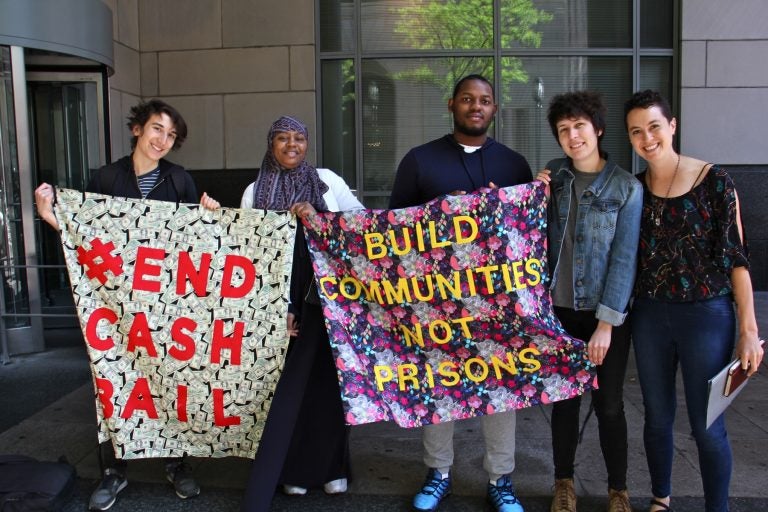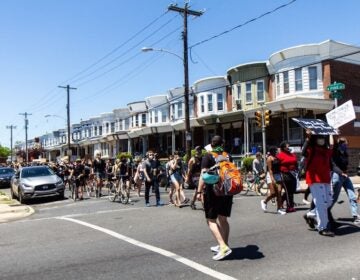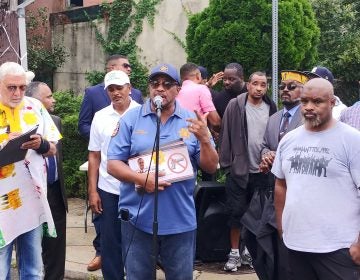Mother’s Day surprise for black women who can’t afford bail
Morning Edition host Jennifer Lynn spoke with Mark Houldin, policy director at the Defender Association of Philadelphia, about the 'Mama's Day Bailout.'
Listen 5:48
Activists with the Philadelphia Community Bail Fund (from left) Milo Giovanniello, Veronica Rex, David Harrington, Eli Hadley and Cara Tratner, stand outside the Criminal Justice Center, while inside, members of the group posted bail for 15 women as part of Mama's Bailout Day. (Emma Lee/WHYY)
One-third of those held in Philadelphia jails before trial are there because they cannot afford cash bail, according to a city controller’s report from last year. That’s 1,400 individuals — and one in three of them would be eligible for release on less than $5,000.
If you’re poor and cannot post cash bail in Philadelphia, you’ll await trial behind bars even for most the petty crimes. It puts a burden on families and the criminal justice system, and it has the city’s new district attorney crying “unfair.”
In an effort to draw attention to the need for changes in the bail system, a consortium known as the Philadelphia Community Bail Fund is bailing out a small group of black women, mothers, and caretakers in time for Mother’s Day.
Morning Edition host Jennifer Lynn spoke with Mark Houldin, policy director at the Defender Association of Philadelphia, about the bailout, which benefits some of his clients. He started by telling the story of one woman.
One woman who’s going to be bailed out this week for Mother’s Day was trying to break up a fight. Police arrived and, assuming she was part of the fight, arrested her and charged her with assault. She was unable to pay $5,000 in bail, and she has been sitting in jail as a result.
—
Many women, and men for that matter, in jail because they can’t afford bail end up having their cases dismissed. Is that what you’re finding?
Yes, a good number of people who are held on bail pretrial estimates are anywhere from a third or even more have their cases ultimately dismissed. Some of those individuals may have been in jail for a week. Some have sat in jail for a year or more simply waiting for their day in court, and having that day in court to find out that there’s no evidence to convict them or not enough evidence to convict them.
So maybe their cases are dismissed? They spent time away from their families, their communities, their work, and for what?
That’s precisely the question. For what? And what we really need to do is focus on the harm that that incarceration causes. And I think what’s beautiful about this bailout is it highlights the importance of families being together. Women being with their children, being with their mothers that they may be caretakers for, keeping their jobs, keeping their place to live and keeping their life on track because we know that any time spent in jail can increase the likelihood that someone may be involved in a crime in the future. It has the opposite effect of what we’re trying to accomplish.
Isn’t the law designed to take into consideration ability to pay bail?
The law says that judges are supposed to consider ability to pay bail but unfortunately in practice given the volume of cases and given the way the system is gone people aren’t paying attention to that factor. As a result, we tend to have bail amounts that tend to be generic one-size-fits all. And that’s not actually how people’s finances are. That approach allows for people who are wealthy to be released and have absolutely no conditions, and those who are poor or of limited financial means have to sit in jail and sacrifice their freedom.
Mark, organizers of this week’s event, Mama’s Day Bailout, say the women they help are caught up in a racist and sexist system of policing and criminalization. Can you explain what they’re saying?
They would be the best people to speak to those comments. But I do think that what they’re highlighting are the significant disparities in who is detained pretrial. Those disparities are real and need to be addressed. And this is both a way to address it for women who will be bailed out. But also to raise awareness of the issue. So hopefully we can all work together to create a system that’s more uniform and more fair.
Do you know how this program chooses the women who will be bailed out and how many will get out of jail this week?
I believe there should be 19 or 20 getting out of jail this week. The Community Bail Fund makes the decisions. We, as the defender office, don’t get involved in choosing. But they do make a point of not disqualifying people based on what they’ve been accused of.
Now of course, they can’t afford bail in very severe cases. If anyone is charged with something like homicide, they wouldn’t even be eligible for bail. But within that, they really take the presumption of innocence seriously to say that you might have been accused of something, but you still deserve your freedom just like someone who had the money to pay. They also do full interviews with everyone who they may bail out and help make sure there are support systems. The last thing they want, the last thing we want, is people to be bailed out and not have the services and support they need to come back to court and make sure their life is on track.
When is cash bail necessary in your opinion?
I don’t believe cash bail is ever necessary. It’s an antiquated concept that needs to end. There may be circumstances where individuals have to be detained pretrial, but the Supreme Court has said that must be carefully limited exception. Unfortunately, it’s become the norm. If individuals need to be supervised, if they need assistance, we can provide that while they’re in the community, but money has never made sense as a way to gain your freedom.
WHYY is your source for fact-based, in-depth journalism and information. As a nonprofit organization, we rely on financial support from readers like you. Please give today.





